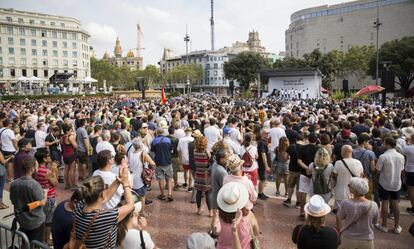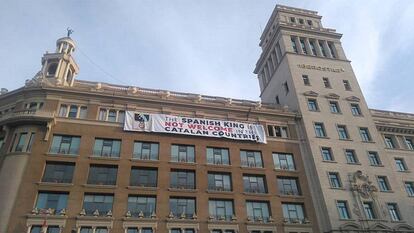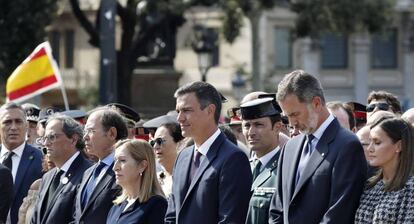Barcelona pays tribute to the victims of last year’s terror attacks
After a similar event in 2017 saw boos and whistles aimed at the king and the prime minister, today’s ceremonies passed by almost without incident, and mostly in silence

Tribute was paid in Barcelona today to the victims of the terrorist attacks that took place a year ago in Las Ramblas and Cambrils (Tarragona), which left 16 people dead and more than 150 injured. The commemorations concluded with an emotional ceremony in the Plaza de Catalunya, under the slogan “Barcelona, city of peace.” The events were focused on the victims of the attacks and the emergency service personnel who attended to them.
After boos and whistling by supporters of Catalan independence at a similar event last year in the wake of the attacks, aimed at Spain’s King Felipe VI and then-Prime Minister Mariano Rajoy, this year the events were predominated by silence. There were, however, some pro- and anti-monarchy supporters in attendance, around 500 people, and there were some clashes between them at the conclusion of the commemoration.
But the national and local authorities had worked hard in recent weeks to try to ensure that the day’s events would not be politicized, and had prepared a ceremony that aimed to give maximum focus to the victims and emergency services.
The events were focused on the victims of the attacks and the emergency service personnel who attended to them
Over the last year, the Catalan drive for independence reached new extremes, with an illegal referendum on secession from Spain held on October 1, widespread outrage at police violence during the poll, a unilateral declaration of independence passed in the regional parliament, and the subsequent arrest of several key politicians for their role in these events. Other figures, such as former Catalan premier Carles Puigdemont, fled Spain and are still wanted for arrest by the Spanish authorities.
The high tensions present at last year’s demonstration, however, were nowhere to be seen on Friday. There were some shouts of “Long live the king!” as Felipe and his wife, Queen Letizia, arrived in the Plaza de Catalunya, as well as shushes from other members of the crowd. What’s more, pro-independence supporters had hung two banners against the monarchy from buildings in the square.

But the mayor of Barcelona, Ada Colau, was intent on ensuring that she lived up to her commitment to leave politics to one side for the day. In the end, the day’s events passed almost without incident, with an emotional silence in memory of the victims.
The morning began with a speech by Catalan premier Quim Torra, who stressed the region’s commitment against terrorist “brutality,” and expressed his “support and solidarity” for the victims. He also praised the work of the former regional police chief Josep Lluís Trapero and the former regional interior chief Joaquim Forn in the wake of the attacks, saying that the latter is “unfairly imprisoned.” Forn is currently in pre-trial custody for his role in last year’s independence drive.
Afterwards, the acts prepared by Barcelona City Hall began. After a private reception, a committee headed up by the victims traveled to the Joan Miró mosaic in Las Ramblas, which is where the van driven by Younes Abouyaaqoub came to a stop after mowing down dozens of people on August 17 last year, and which has become a memorial spot to the victims. There they were received with applause from members of the public, and laid flowers. They then traveled to the Plaza de Catalunya by bus.

In attendance at the main ceremony were Prime Minister Pedro Sánchez, regional premier Quim Torra, Barcelona Mayor Ada Colau, congressional speaker Ana Pastor, and regional government speaker Roger Torrent.
After live music was played, journalist Gemma Nierga made a speech, which drew attention to the emergency services and members of the public who helped the victims in the immediate aftermath of the attack. Then the poem For Whom the Bell Tolls, by John Donne, was read in the eight languages spoken by those who were killed in the attacks. After more music, the same shouts were heard as at the end of last year’s demonstration: “We are not afraid.”
English version by Simon Hunter.
Tu suscripción se está usando en otro dispositivo
¿Quieres añadir otro usuario a tu suscripción?
Si continúas leyendo en este dispositivo, no se podrá leer en el otro.
FlechaTu suscripción se está usando en otro dispositivo y solo puedes acceder a EL PAÍS desde un dispositivo a la vez.
Si quieres compartir tu cuenta, cambia tu suscripción a la modalidad Premium, así podrás añadir otro usuario. Cada uno accederá con su propia cuenta de email, lo que os permitirá personalizar vuestra experiencia en EL PAÍS.
¿Tienes una suscripción de empresa? Accede aquí para contratar más cuentas.
En el caso de no saber quién está usando tu cuenta, te recomendamos cambiar tu contraseña aquí.
Si decides continuar compartiendo tu cuenta, este mensaje se mostrará en tu dispositivo y en el de la otra persona que está usando tu cuenta de forma indefinida, afectando a tu experiencia de lectura. Puedes consultar aquí los términos y condiciones de la suscripción digital.








































